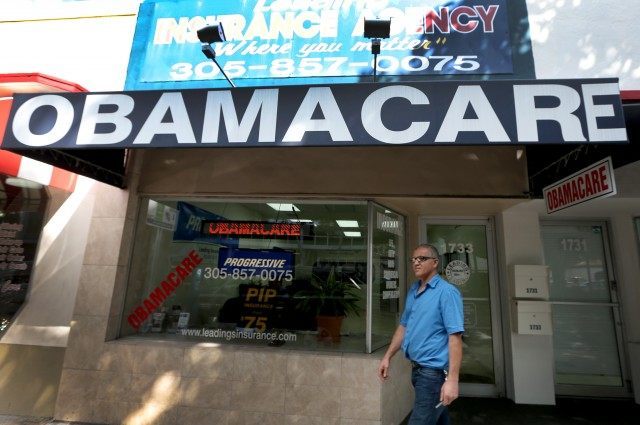On Tuesday, Aetna, the third largest health insurance company in the country, announced it was quitting America’s Health Insurance Plan,(AHIP), the powerful lobbying group for the health insurance industry. The company is the second to leave the group, after UnitedHealthCare quit the group in June.
At the time, UnitedHealthCare said its interests, and the interests of its customers, were “no longer best represented by AHIP.” A health care executive, when asked about Aetna’s decision, told The Hill newspaper, “There’s a sense that AHIP has become a one-trick pony for the Obama administration,” especially in relation to advancing ObamaCare.
Earlier this year, AHIP announced the departure of its long-time CEO, Karen Ignagni. She was replaced by Marilyn Tavenner, who oversaw the implementation of ObamaCare as administrator for the federal Centers for Medicare and Medicaid Services. Tavenner was the federal official charged with rolling out the ObamaCare website in October 2013.
The disastrous rollout of the ObamaCare website, which drew criticism even from Democrat backers of the law, certainly hasn’t damaged the career prospects of Ms. Tavenner. A larger problem for members of AHIP, however, could be that Ms. Tavenner currently receives $162,000 a year in retirement benefits from Hospital Corporation of America.
The health insurance industry is often on the opposite of hospitals on many policy issues. Although Ms. Tavenner likely earns far more from AHIP than her pension from HCA–Tavenner’s predecessor Ignagni earned $2 million a year–it is still a potentially significant conflict of interest for the head of an insurance lobbying association.
Another possible bone of contention is that Ignagni left AHIP to become CEO of EmblemHealth, itself a health insurance company and competitor to Aetna and UnitedHealth. Emblem is a smaller, regional, health insurance company based in New York State.
The Hill quoted anonymous health care lobbyists who said AHIP had increasingly focused its lobbying activities for the benefit of smaller health insurance companies.
One of the biggest open secrets in Washington is that ObamaCare was largely written by lobbyists for the health insurance industry, pharmaceutical companies, and hospitals. While Democrat politicians still like to rip apart the health care industry on the campaign trail, they built ObamaCare generally around the needs of the industry.
AHIP, which had famously derailed Hillary Clinton’s efforts for a federal take-over of health care, played a leading role in advancing ObamaCare. As Politico noted:
Ultimately, the industry, with Ignagni at the helm, decided to back the Affordable Care Act, which reshaped how her industry operates.
“It required the insurance industry to be behind it,” said Joe Antos, a health care policy expert at the conservative American Enterprise Institute. “It was absolutely essential.”
One industry insider told Breitbart News, “AHIP’s leadership supported Obamacare all along, despite the impending disaster. They got into bed with an Administration that deep down supports single payer health care and now the ‘chickens are coming home to roost.'”
The foundational flaw of ObamaCare is that it required insurance companies to greatly expand the benefits of health care coverage while also requiring coverage for people who were already sick. The challenge of covering “preexisting conditions” is that these individuals haven’t previously paid premiums that are used to cover medical expenses. Its the actuarial equivalent of buying fire insurance after your house has burned down.
In exchange for insurance companies accepting these coverage mandates, the government required all Americans to purchase health insurance. Drafters of the law hoped that enough healthy, young people would purchase insurance that the higher costs of coverage could be absorbed.
It has not worked out that way.
The health industry insider told Breitbart News, “Everyone with a basic understanding of insurance markets and third grade math skills knew Obamacare’s supposed private marketplace would collapse. The fatal design flaws guaranteed that more sick people than healthy people would sign up. That is exactly what is happening.”
“Several states tried this in the 1990s with the same result,” the insider noted. “You can’t drain the swimming pool faster than you’re filling it.”
The ObamaCare law actually admitted this problem by including bail-out payments, i.e. risk-corridor payments for insurance companies whose costs exploded. The law planned to fund these payments out of user fees paid by insurance companies who did better than expected in the ObamaCare marketplaces.
Unsurprisingly, the losers in the marketplaces far outweighed the winners. In just the first year, health insurance companies submitted losses of $2.5 billion to the federal government. User fees to pay these losses, however, were only $362 million. The federal government is currently planning to reimburse these losses over the next three years. Presumably, though, additional losses will still accrue in those later years.
One does wonder how confident the drafters of ObamaCare were, since they built a bail-out program for insurers into the law. They didn’t, apparently, anticipate the scale of the losses in the marketplaces.
In the past several months, several private insurance companies have announced plans to possibly exit the ObamaCare marketplace. Absent such a drastic action, health insurance companies will be looking for legislative and regulatory changes to bring some financial sanity to the law.
It isn’t too surprising, then, that Aetna and UnitedHealth would quit the industry lobbying association that advocated so aggressively for ObamaCare – especially considering that the lobbying group is now headed by someone who was instrumental in implementing ObamaCare.
The inherent problem in Washington isn’t lobbyists. It’s that government inevitably captures the lobbyists and partners with them to expand government. For someone like Ms. Tavenner, heads she wins and tails we lose.

COMMENTS
Please let us know if you're having issues with commenting.